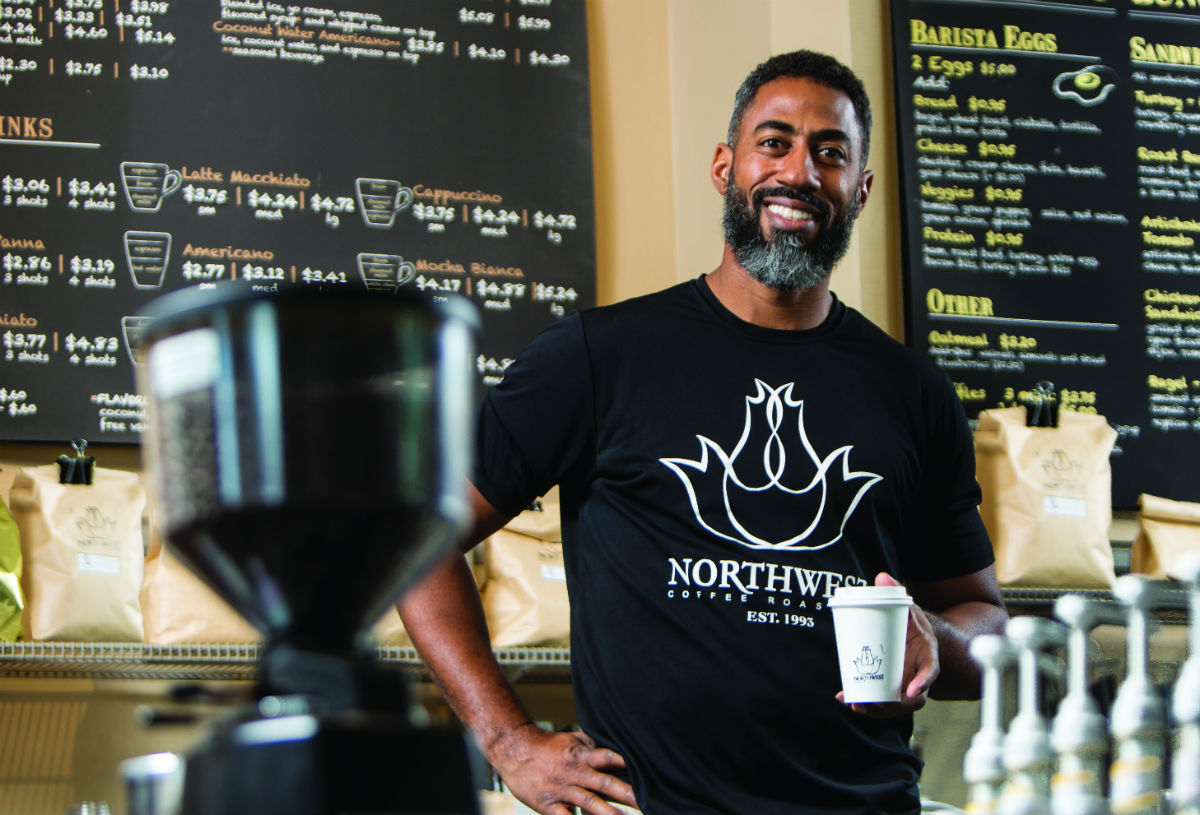Jason Wilson: His values-based, data-driven decision
- January 2, 2019
- By Kurt Greenbaum
- 3 minute read

The 2018 Olin Business magazine shared a series of vignettes featuring alumni faced with a business decision requiring them to weigh data with their values.
We featured these stories to support Olin’s strategic pillar focused on equipping leaders to confront challenge and create change, for good. This is the first of those vignettes.
Chronicle Coffee opened in north St. Louis City in 2013, sleek with sea-foam walls and civil rights-era photos, adorned with hefty schoolhouse chairs and overstuffed leather sofas.
Jason Wilson, EMBA ’08, spun off the new java joint from his thriving Northwest Coffee Roasting Company, which had stores in affluent neighborhoods in Clayton, Missouri, and St. Louis’ Central West End.
But the corner of Blumeyer and Page avenues in north St. Louis was not an affluent area. It was a community in need of a little TLC, a location where Wilson saw opportunity—but perhaps not the kind of opportunity entrepreneurs typically seek out.
“We wanted to fill this void of a food desert and offer quality products on the north side of St. Louis,” Wilson said. “But the data suggested I should not do that.”
The median income in the area was lower than Wilson was used to serving. Population density was lacking. Foot traffic on the street was sparse. “I had to look at other data points that were more civic minded,” he said. “What else is important?”
He looked at the value of creating a community center in a building that served clients of subsidized housing. He explored the ways Wi-Fi internet would help customers, how community programming might build traffic, how a gathering spot for conversation would enliven the neighborhood.
For a while, Chronicle Coffee looked like it might work. “The folks that buy coffee love the fact that I’m in north St. Louis,” Wilson told a local food magazine at the time. “I’ve also been received pretty well by the immediate community.”
Then, in August 2014, Michael Brown was shot in Ferguson, Missouri. Sales nosedived. Before the year was out, the store failed.
“I took a major hit. In business, revenue minus expenses equals profit. That’s the rule,” Wilson said. “But I wanted to help people out. Am I wrong?”
Leadership decisions, for good
Wilson’s story is emblematic of a growing philosophy of leadership baked into the strategic plan Olin Dean Mark Taylor has rolled out to the business school. Since his arrival at Washington University in December 2016, he has spoken often about creating an academy of leaders who are prepared to make values-based, data- driven decisions. Yes, business is business. ROI is important. But true business leaders understand that the bottom line is not the only gauge of success. Staying true to individual, corporate, and societal values must figure into the equation.
“We want our people to think more broadly about their role,” said Stuart Bunderson, co-director of Olin’s Bauer Leadership Center and the George and Carol Bauer Professor of Organizational Ethics and Governance.
“How can our leaders be maximally responsive to all their stakeholders?” he said. “There is not a small set of values that is important. What’s more important than making a buck? Figure that out and take action based on those values.”
In the end, Wilson’s store failed, but a positive result emerged: His coffee is served at Grounds for Change, the coffee shop in the Brown School of Social Work’s newest building, Hillman Hall. Originally attracted by Wilson’s mission, they were sold on the high-quality coffee and beans. “It’s because I went on the north side and tried to do that.”
Media inquiries
For assistance with media inquiries and to find faculty experts, please contact Washington University Marketing & Communications.
Monday–Friday, 8:30 to 5 p.m.
Sara Savat
Senior News Director, Business and Social Sciences
